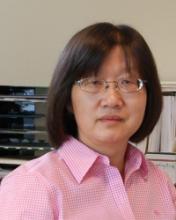The Department of Economics is proud to have an accomplished and dedicated team of faculty members. Once per quarter, we will highlight one professor’s teaching and/or research activities and their impact on our program. For our first Faculty Spotlight, we will be showcasing the work of Castor Professor of Economics Yanqin Fan in a Q and A style.
Can you give us an overview of your current research?
My current research focuses on applications of optimal transport in economics/econometrics. Optimal transport is the general problem of moving one distribution of mass to another as efficiently as possible. It has a wealth of applications in diverse fields (mathematics, statistics, economics, image processing, data science, domain adaptation, and transfer learning, etc.) and is currently an extremely active research area in both theory and applications.
My research in this area can be broadly put into two groups. One group makes use of the monotone optimal transport map associated with quadratic cost to address important issues in economics/econometrics such as modeling and characterizing the dependence structure between random vectors (Fan and Henry, 2021, “Vector Copulas”); measuring and comparing multidimensional inequality (Fan, Henry, Pass, and Rivero, 2022, “Lorenz Map, Inequality Ordering and Curves Based on Multidimensional Rearrangements.”) In the latter paper, we develop multidimensional tools extending the univariate Lorenz curve and Gini index and apply them to measure income-wealth inequality in the United States between 1989 and 2019. In a work-in-progress with Xiaohong Chen at Yale University and my student, Wendao Xue, we develop estimation and inference methods for average treatment effects under limited overlap.
The second group of works exploits the fact that the minimum expected quadratic cost in the optimal transport problem is a distance between two distributions known as Wasserstein distance. Several of my current works with my students make use of the Wasserstein distance and its sliced version to construct estimation and inference in non-regular structural econometric models such as parameter-dependent support modes and stochastic singular models (with Hyeonseok Park); distributionally robust estimation and inference in econometric models (with Yoon Choi and Gaoqian Xu); and topic modeling/text analysis (with Yigit Okar and Xuetao Shi (a former student, currently an assistant professor at the University of Sydney).
What courses have you taught this year?
I taught ECON 583 in the fall. I am teaching ECON 585 and 599 in this quarter. ECON 583 introduces a general framework for the estimation and inference in parametric econometric models based on optimization estimators. Building on ECON 583, I introduce optimization-based estimation and inference in nonparametric and semiparametric models in ECON 585. ECON 599 is a research seminar course in econometrics, with topics that change from year to year. This year, the main topic is distributionally robust estimation and inference in econometric models. Although different types of ambiguity sets can be constructed, we focus on optimal transport-based ambiguity sets such as Wasserstein 1 and Wasserstein 2 ambiguity sets. Three students, Hyeonseok, Yoon Choi, and Gaoqian Xu have already started working in this area.
What sets the UW Department of Economics apart from other programs?
The strong support of the Visiting Committee makes UW Economics unique. I appreciate the generous support from Castor Professorship. It has allowed me to devote more time to my research, support my students, and to organize conferences/seminars.
UW Economics is also unique in its close ties with other units on campus and industries, such as Amazon and Microsoft. There are abundant opportunities for interdisciplinary research and collaboration on campus and with outside companies. I have successfully collaborated with colleagues within the Department of Economics, as well as faculty in the Departments of Statistics, Mathematics, and Biostatistics. My current research on applications of optimal transport is inspired by frontier research done by faculty in Statistics, Mathematics, and Computer Science at UW. I am an affiliate member of the Kantorovich Initiative, which is dedicated towards research and dissemination of modern OT mathematics towards a wide audience. My students and I have benefited from the many activities of the Kantorovich Initiative such as OT courses, workshops, and the recent KI retreat. I have used my Castor Professorship to support the KI retreat and the upcoming summer school on OT at UW. We were able to arrange a recent introductory talk on OT by Zaid Harchaoui in the Department of Statistics and a member of KI to more than 130 participants at Amazon and the Department of Economics.
What are you looking forward to in the coming academic year?
Summer is always the time to focus and make progress on research. Each academic year, I am excited to see my students present their research progress and discuss their plans for the next step. I am also looking forward to participating in the newly started Faculty Brownbag series within the department to learn more about my colleagues’ research and to have in person interactions with my colleagues and students.
Professor Fan continues to be an involved leader in our department who inspires us with her dedication to her students, fellow faculty, and advancing the field of economics. We are proud to recognize her and her many accomplishments. If you are interested in learning more about her and her work, visit her full faculty profile here.
